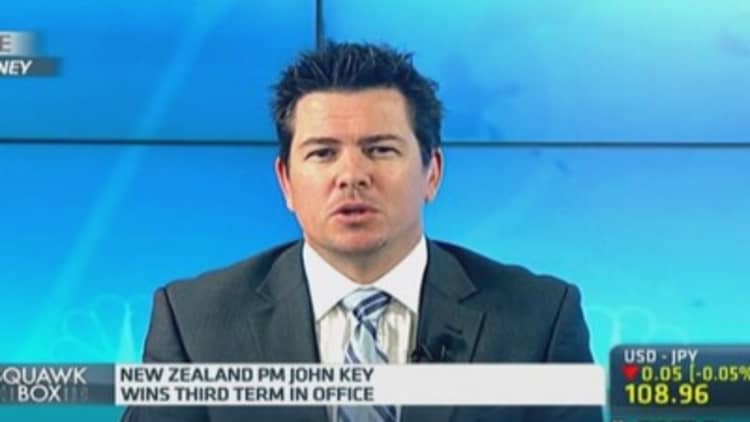
New Zealand stocks cheered the governing National Party's emphatic election victory over the weekend, but analysts warned the 'rock star' economy faces mounting headwinds.
Prime Minister John Key gained 48 percent of the vote and 61 of the 121 parliamentary seats available - the first time one party has secured a majority in New Zealand in over 20 years. The news pushed the NZX 50 index up 1.25 percent in early trading Monday.
While some analysts view the stock surge as a sign of confidence in how the incumbent government is handling the economy, others warn the good times may soon end.
Headwinds loom
"New Zealand's extraordinary outperformance in recent times is behind us," Sung Woen Kang, analyst at Morgan Stanley, said in a note published Monday.
Read MoreNew Zealand Prime Minister John Key wins third term
New Zealand was labeled a 'rock star' economy this year due to its outperformance of other developed markets. It grew 3.9 percent on year in the second quarter,the fastest rate since the second quarter of 2004. However, growth slowed to 0.7 on quarter, suggesting a peak in the current growth cycle.
According to Kang, the 100 basis points of rate hikes that the Reserve Bank of New Zealand (RBNZ) has carried out this year are starting to make their mark on the economy, while subdued global growth is set to suppress demand for the nation's major exports.
Kiwi dollar strength is another headwind, Kang said; the currency gained around 7 percent against the greenback in the first half of the year, boosted by the high interest rate differential between New Zealand and other advanced economies, he said.
"[Domestic headwinds] have included negative momentum in dairy export prices and payouts, the cooling housing market and lower-than-expected inflation prints, partly due to the elevated exchange rate," said Kang.
Prices for dairy- one of the nation's major exports - are down around 42 percent on year amid Russia's ban on European Union dairy imports and oversupply in China. Russia and China are the two largest dairy importers globally.
Furthermore, New Zealand Treasury Secretary and Chief Executive Gabriel Makhlouf told CNBC on Sunday that the economy was showing signs of weakening.
"We're forecasting that [the strong growth performance] will taper off a bit but we certainly want to move from being described as a 'rock star economy'… to being a 'rock solid' economy," he told CNBC.
An upbeat view
Paul Bloxham, chief economist for Australia and New Zealand at HSBC, maintains his bullish 3.4 percent 2014 growth forecast for New Zealand, which would mark the fastest pace since 2007 and is well above trend growth of 2.5 percent.
Read MoreNew Zealand to move from rock star to rock solid economy
"The economy has been doing very well. In fact we think it will be the fastest growing OECD economy for this year. So it wasn't a surprise that the incumbent government is staying in power," he said.
While the outlook for New Zealand isn't rosy, Bloxham believes it will withstand headwinds.
"The dairy story does look a little less promising, but the thing is the New Zealand economy's strength is not just to do with the dairy story, there are a range of factors lifting growth in New Zealand," he said.
Bloxham highlighted the positive impact of the rebuild following the 2011 Christchurch earthquake, which expects to support growth for at least another 18 months. He also expects the construction sector to pick up generally.
"The new government has an even stronger mandate to continue down a reform path to support medium-term growth," he added.



